There’s a certain satisfaction in picking up a fantasy novel and knowing it’s a standalone. For one, you won’t have to wait a year, or two, or even five before you find out what happens next. In that time you’ve invariably forgotten much of the first, or previous book anyway, so a lot of the time you have to reread to get up to speed. Also, you won’t end up picking up an interesting looking fantasy novel from the shelves, starting it, then realizing it’s actually book two of a trilogy, or book four in a ten book series.
With Blood of the Four, we wanted to build a big, epic world full of fascinating characters, and tell a story that comes to a definite end. The reader will hopefully end up satisfied, the story threads come together. Of course, that’s not to say there aren’t other stories that could be told about that vast world of Quandis…
We were partly inspired by other great standalone fantasy novels we’ve read, but because we read so broadly in so many different genres, when we discussed making this list, we also wanted to take a broad definition of fantasy. Here are just a small selection of our favorite fantastical epics, with a few words about why we think they work so well. We came up with the list together, then split them up, three a piece.
Tim Lebbon picks…
Imajica by Clive Barker
Buy the Book
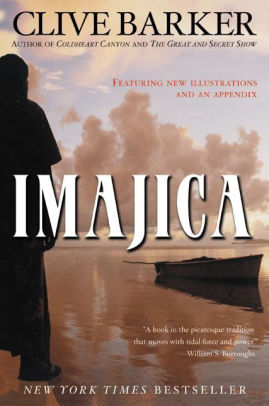

Imajica
Weaveworld and The Great and Secret Show were classics, but for me Imajica is Barker’s fantasy novel (admittedly with some pretty dark horror elements) that works best. Perhaps part of that is nostalgia—I was reading this book whilst on holiday with my wife when we were very young—but there’s also an epic sense of scope and import to the book. It’s a triumph of imagination, a wide-reaching story that not only addresses questions of religion, sex, love and politics, but also makes the reader really think about why our world is as it is … and whether, perhaps, it might make more sense if it was meant to be part of other realms.
Jonathan Strange & Mr. Norrell by Susanna Clarke
Buy the Book
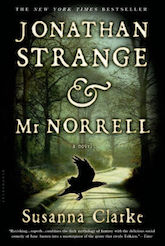

Jonathan Strange & Mr. Norrell
Now this is an epic one. A fantasy or an alternate history, however you read it this is a beautiful, precise, exciting and thrilling novel of England and English magic. A novel so large that took so long to write naturally benefits from being standalone, and the story is a rich tapestry with many threads, winding their way through 800 pages, crossing and twisting as magic—real, and perhaps not so real—weaves its own hold over characters and readers alike. Strange and Norrell are very different men, with very different experiences of magic. Their stories are destined to clash, and the repercussions of such a butting of minds and magics echoes throughout the novel. With fine world-building and intricate historical detail (both real and not-so-real), perhaps the book’s greatest gift is the wonderful character writing told on such a wide scale. Brilliant.
Perdido Street Station by China Mieville
Buy the Book
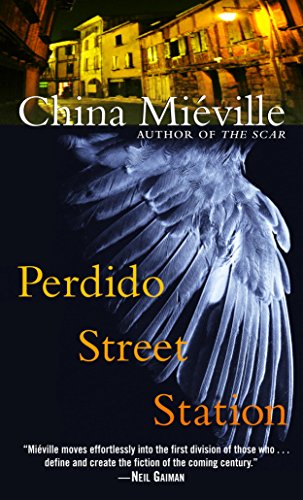

Perdido Street Station
Edging just a little further from epic fantasy, perhaps, but for me this novel is a brilliant example of world-building. Stunning architecture, animal and human-like species, political intrigue, flora and fauna … and monsters. Mieville’s love of monsters is well documented, and in his fantastical city of New Crobuzon, and the wider world of Bas-Lag, he has ample opportunity to indulge his passion. It’s one of several stories set in that imaginary world, but it’s very much standalone. There’s a power to Mieville’s language that instils a real sense of wonder in his creations, and the novel is adept at holding up a mirror to our own world … bad aspects, as well as good.
Christopher Golden picks…
Mythago Wood by Robert Holdstock
Buy the Book
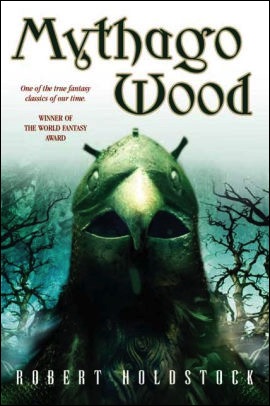

Mythago Wood
It’s probably cheating, because Holdstock went on to write numerous other novels that are tied to this one, but Mythago Wood reads very much as if those expansions and further explorations were additions. Second thoughts. He finished this one and decided he had more to say—at least that’s how I’ve always viewed it. A beautiful journey and a fantastical mystery, this is The Lost City of Z, with every acre of forest peeling back centuries of ancestral memory and digging at the roots of folklore. A classic.
Uprooted by Naomi Novik
Buy the Book
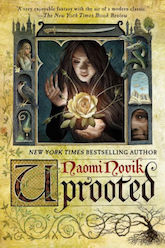

Uprooted
I had the pleasure of reading this one long before publication thanks to a blurb request from the publisher. While Novik’s much-beloved Temeraire series is a sprawling series, Uprooted is the perfect example of a standalone fantasy. A mysterious wizard selects one village girl every ten years to snatch away to his remote, lonely castle. There are echoes of Beauty and the Beast, and of Jonathan Harker from Dracula, as Agnieszka begins to unravel the story’s mysteries, but it’s when she journeys into the heart of the rot at the heart of the Wood that the deep dread of Novik’s tale blooms into a unique and beautiful epic.
Moonheart by Charles de Lint
Buy the Book
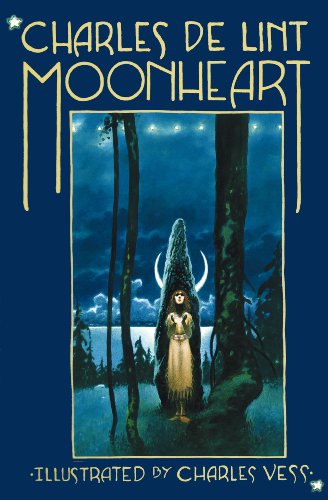

Moonheart
Before we found our contemporary understanding of “urban fantasy” as a category, authors like Charles de Lint and Emma Bull invented it. Some of De Lint’s stories weave legend and folklore and quests and magic and crusades into a real world environment, while others are set in more traditional fantasy worlds. First published in 1984, Moonheart was a revelation to me, as it succeeded in merging the two and adding in the character depth, the friendship, the longing, and the humanity that are de Lint’s signatures. Wizards, cops, monsters, bikers, a familiar Welsh bard, and a massive, sprawling commune full of people who are both lost and found. Tamson House is waiting for you. Tell everyone there I said hello.
Originally published in March 2018.
CHRISTOPHER GOLDEN is the New York Times bestselling author of such novels as Of Saints and Shadows, The Myth Hunters, Snowblind, Ararat, and Strangewood. With Mike Mignola, he co-created the comic book series Baltimore and Joe Golem: Occult Detective. He lives in Bradford, Massachusetts.
TIM LEBBON has written more than forty horror, dark fantasy, and tie-in novels, including The Silence, Relics, Kong: Skull Island, and the Noreela fantasy series. He’s also written hundreds of novellas and short stories, winning several prestigious awards, and has had his work optioned and made for the big screen. He lives in Monmouthshire, UK.










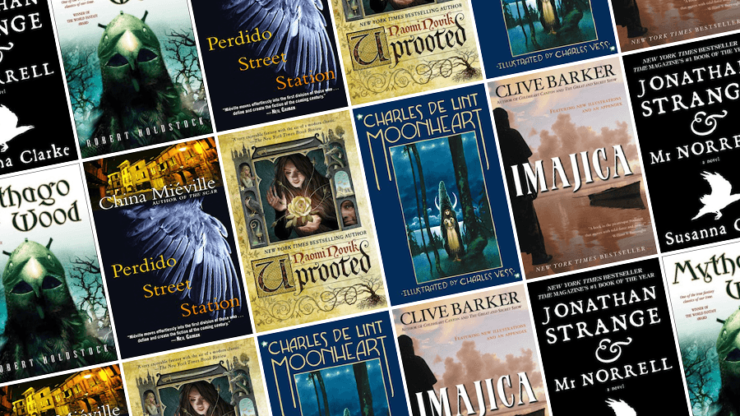
my choices include: The Forgotten Beasts of Eld by McKillip; Faerie Tale by Feist; and Cowboy Feng’s Space Bar and Grille by Brust.
Little, Big by John Crowley.
I think there was another post on standalone fantasy novels, but I will happily repeat myself here, and hope for more suggestions in the comments this time around…since Tiffany Aching, Ged and Frodo aside, I only read standalone fantasies. Here’s my top five list:
The Goblin Emperor–Katherine Addison
The Moon and the Sun–Vonda McIntyre (I’m assuming Dreamsnake qualifies as SciFi)
The Last Unicorn–Peter S. Beagle
The Brides of Rollrock Island–Margo Lanagan
Od Magic–Patricia McKillip
Jacqueline Carey’s recent, “Starless” was wonderful, and absolutely designed to be a stand alone, epic fantasy novel.
I’m confused as to why “Perdido Street Station”, while being a standalone story, is part of the Bas-Lag series, and would be on here and not others that share a similar fate. I would argue that The Lord of the Rings is one book (since it is) and most of LeGuin’s Earthsea saga are standalone works as well. They’re just vignettes of parts of Ged’s life for the most part. For the first commenter, I think that’s why those works are outliers for you (and me- I prefer standalone usually). I just want consistency: standalone to me is a book with nothing else connected to it, not merely a story that is complete in and of itself without pushing toward a sequel. Don’t get me wrong, I love Perdido Street station, but if it counts as a standalone, there are better works that would also count.
War For The Oaks – Emma Bull.
The Wood Wife – Terri Windling
Winter Rose – Patricia McKillip
Lorien Lost – Michael King
Robert J Crane Sanctuary Series. It Is SUPERB !!!
A few “standalones” that stand out for me:
Tigana, by Guy Kay
Donnerjack, Zelazny and Lindskold
Etidorpha, John Uri Lloyd
The Dragon Waiting: A Masque of History by John M. Ford
Tam Lin by Pamela Dean
@5
The most obvious difference between the Earthsea books and Bas-lag are that each Bas-lag story is comprised of completely different characters with little to no ties to the previous story, other than the setting. Each tale can be read without previous knowledge of the book before (or after) it. I do think the Earthsea books can be read as standalones as well, but there are major differences between the two, since we’re comparing. And as much as I enjoyed Earthsea, those books just lack the creative touch and unique flair of Bas-lag. PSS and The Scar are, imo, two of the best standalone fantasy/scifi books out there, if what you’re looking for is truly unique worldbuilding and strange/interesting monsters/characters, respectively.
@11
I can see where you’re coming from with that, but there is enough connections between the Bas-Lag books that they build upon each other, and I’ll grant that PSS does have some excellent world-building and was intended as a stand-alone. It just feels like a little bit of a cheat here with the title and description (and even an admission by the authors to this tune, which I appreciate, but doesn’t lessen my criticism). The original Dune is a standalone, and was crafted as such. Herbert just kept writing after it took off, adding to the world. Granted, it’s more Sci-Fi than fantasy (but I also take PSS to include Sci-Fi and many other genres), but should Dune also be considered a standalone? Anything that is a standalone and starts what becomes an initially unintended series could qualify. That would be an interesting list to compile. With such a nice list and ideas here, I guess I really wanted to see some true standalone works.
+1,000,000 on The Dragon Waiting.
Lifelode, and Among Others, by Jo Walton.
Mockingbird and Nobody’s Son, by Sean Stewart.
Saavik @@@@@ 3:
I think there was another post on standalone fantasy novels …
Indeed — there was Sarah Waites’s post “Tired of Series? Try These 10 Standalone Fantasy Novels” about two months ago. (And this particular post is recycled from this past March, of course.)
A definite +1 for “The Goblin Emperor”.
Also, even though Brandon Sanderson is probably better known for his series, I cannot not mention “Elantris” and “Warbreaker”, which are standalones (so far).
I’m no good at ranking things, but along with other good suggestions above, I’d throw in Greg Bear’s Songs of Earth and Power (if it’s OK that it was originally published in two parts) which also has the distinction of being the only fantasy novel by that author.
Also – @5: “I just want consistency: standalone to me is a book with nothing else connected to it, not merely a story that is complete in and of itself without pushing toward a sequel”
If that’s what you want to read, fine, but it’s not what this article is about; I think the authors defined what they meant pretty clearly. Also, if “there’s nothing else connected” were the standard, then we’d have to drop Strange/Norrell (since some of its characters are also in The Ladies of Grace Adieu), which for me is reason enough not to make that the standard.
Hey, everybody, sad news for fandom, Betty Ballantine died after a long, storied (sorry) career. Just perusing the list of titles in the Ballantine Adult Fantasy Series reveals a number of outstanding standalone novels, such as Poul Anderson’s The Broken Sword and Hope Mirrlees Lud-in-the-Mist.
Three Hearts and Three Lions, Poul Anderson
Silverlock, John Myers Myers
Tiger Burning Bright, Mercedes Bradley, Marion Zimmer Bradley, Andre Norton
Magic, Inc., Robert A. Heinlein
Conjure Wife, Fritz Leiber
Dracula, Bram Stoker
A Night in the Lonesome October, Roger Zelazny
@5: “I just want consistency: standalone to me is a book with nothing else connected to it, not merely a story that is complete in and of itself“
That’s the key. imo, ALL published novels should be complete in and of themselves! I hate it when an author (or publisher, in the case of Tolkien, for instance) ends the book without resolving the major plot, to the point of banning those authors from my shelves (well, not Tolkien, but I wonder if I could have got into him at this point in my life).
So, apparently this page is just about well-written novels that don’t grab at your wallet by forcing you to buy the next book…
Though I still have to disagree with you about Perdido Street Station. Nobody is better than Mieville! [It’s pistols at dawn if you can’t agree.] And when I read PSS (the first two times) there were no other Bas Lag novels, and none expected.
Land of Laughs, by Jonathan Carroll. Probably my favorite novel of all time, I’ve re-read this one several times and still marvel at the way it slowly segues from the mundane into the magical.
Only Forward, by Michael Marshall Smith. This one is arguably SF, but – the dreaming aspects always made it feel like fantasy to me. It’s so imaginative and wonderfully weird.
@20, Land of Laughs was the first Jonathan Carroll I read and I think it’s still his very best. I own an extra copy to lend out in case someone doesn’t give it back.
@6, I bought The Wood Wife from a tiny new age shop because I felt bad walking out without purchasing anything after the owner had been so nice, but ended up really enjoying it.
I definitely feel like a Guy Gavriel Kay book should be on these lists since most of what he writes is standalone fantasy.
I am going to pick Tigana as a result.
There are so many from among older books:
Tam Lin by Pamela Dean
Beauty by Sheri Tepper
Beauty by Robin McKinley
Stardust by Neil Gaiman
Bright and Shining Tiger by Claudia Edwards
Tea with the Black Dragon by RA MacAvoy
Summers at Castle Auburn or The ShapeChanger’s Wife by Sharon Shinn
Master of All Desires by Judith Merkle Riley
The Thread that Binds the Bones by Nina Kiriki Hoffman
Stranger at the Wedding by Barbara Hambly
Tigana by Guy Gavriel Kay
Thank you for choosing a Charles deLint novel. It feels like he’s been forgotten lately.
Sharon Shinn is one of my favorite standalone authors :) She has a lot to choose from.
I also love the Lions of Al-Rassan by Guy Gavriel Kay, as well as a Song For Arbonne by the same. They do technically take place in a shared world but have nothing to do with each other.